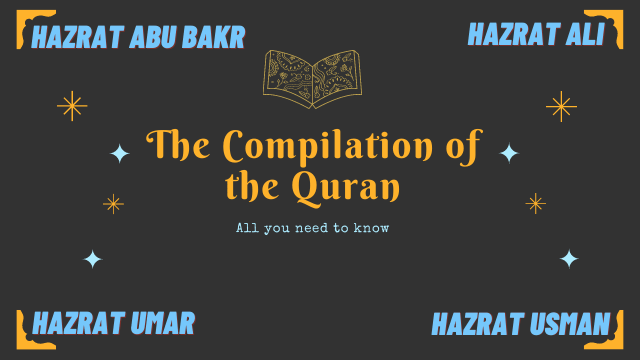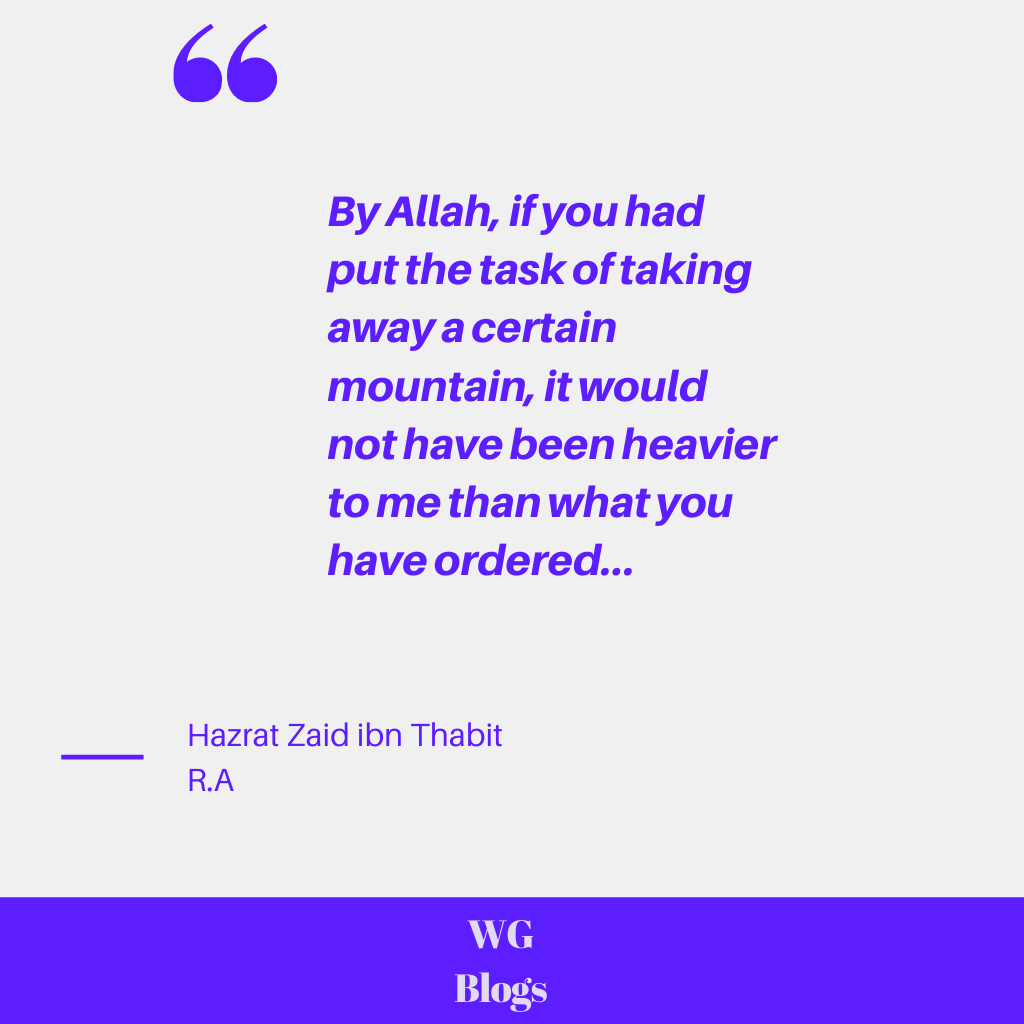The compilation of the Quran is a very important event in the history of Islam. It is the word of Allah almighty who himself has promised to safeguard this book (Al-Quran) from corruption.
The process of the compilation of the Quran started during the lifetime of the Prophet (PBUH). So, let’s dive into the topic from this point.

Holy Prophet (PBUH) and the preservation of Quran
Memorization:
The Prophet (PBUH) used to memorize the Holy Quran after it was revealed. At the command of Allah almighty, angel Gabriel recited the Quran to the Prophet (S.A.W).
The Prophet (S.A.W) encouraged his companions to learn the holy Quran. In this way, the Quran was learned by Muslims.
The Prophet (PBUH) repeated the entire Quran with angel Gabriel during the month of Ramadan. However, according to a hadith in Sahih Bukhari, he revised the Quran twice in the year he died.
Writing:
The Quran was written down during the lifetime of the Prophet (peace be upon him). After a revelation, the Holy Prophet (S.A.W) asked his companions (scribes) to write down the revelation.
The Quran was written down on various items, such as:
- Palm tree branches
- Bones (of animals such as goats and sheep) and leather
- Stones
The prominent scribes (R.A) (those who wrote down the Quran) are:
- Abdullah ibn Masood
- Ubbay bin Ka’ab
- Abu Zaid
- Mu’adh ibn Jabal
- Zaid bin Thabit
When talking about the compilation of the Quran, you should know that the Holy Quran was compiled in a book form in the caliphate of Hazrat Abu Bakr, Umar and Usman (R.A). In the lifetime of the Prophet (PBUH), the Quran was written down but, it was not compiled in a book form.
Let’s discuss how was the Quran compiled during the Rashidun caliphate.
Hazrat Abu Bakr (R.A) and Hazrat Umar (R.A):
It all started with the battle of Yamammah. Musailma claimed himself Prophet during the lifetime of the Prophet (PBUH). After the death of the Prophet (S.A.W), the support of Musailma grew.
The battle which was fought against him caused the loss of a very large number of Huffaz (people who had learned the Quran by heart).
Hazrat Umar (R.A) pondered over the fact that the Huffaz Quran would either be martyred or die by natural death. Therefore, it was mandatory to compile the Holy Quran so that the future generations would not be deprived of it.
Hazrat Umar (R.A) discussed the matter with Hazrat Abu Bakr (R.A). Initially, he was not willing for this because he claimed that if this task was to be done then, Holy Prophet (S.A.W) would have done it.
However, after some time he was convinced. He appointed Hazrat Zaid ibn Thabit to collect the Quran which was preserved in written form. He himself was a Huffaz and therefore, he counter checked the inscriptions.
It is reported in Sahih Bukhari that Hazrat Zaid said that it would be far easier to carry a mountain on his shoulders than the compilation of the Quran because it was a very difficult task.
Hazrat Zaid (R.A) worked tirelessly and collected every single piece of the Quran varying from leather to stones.
After the compilation of the Quran, the copy was given to caliph, Hazrat Abu Bakr (R.A). After his death, the copy transferred to the next caliph, Hazrat Umar (R.A) and after his death, it was kept with Hazrat Hafza bint Umar. This copy is known as Mushaf-e-Hafza.

Hazrat Usman (R.A):
This was the period when the Muslim state expanded. A variation was witnessed in the recitation of the Quran in the Armenia battles among Muslims from Iraq and Damascus.
A companion, Hudaifa ibn Yaman, observed this difference in the dialect of reading the Holy Quran. He immediately approached Hazrat Usman concerning the issue because this was likely to create a rift between the Muslims.
Hazrat Usman (R.A) asked Hazrat Hafsa to hand over the original copy of the Holy Quran. A committee under Zaid bin Thabit was given the task to make perfect copies of the Quran as follow the dialect of Quraish because Prophet Muhammad (S.A.W) was from amongst them.
After the preparation of the copies of the Holy Quran, they were dispatched to every province, one copy of the Quran. All the wrong copies of the Quran were burned on the order of Hazrat Usman.
With this, Hazrat Usman managed to unite the Muslim Ummah and he is known as Jami-al-Quran as he brought Muslims to a uniform reading of the Holy Quran.
Related: Battle of Hunain | GCE O level | Complete guide
With this, the Holy Quran was compiled in a book form. Now let’s find out why was it important to compile the Holy Quran?
Hazrat Usman and Hazrat Ali (R.A) also played a very special role in ensuring that the Quran was read in the correct way. Schools were opened that taught the correct way of reading and reciting the Holy Quran.
A museum opened in Makkah also features verses of the Quran inscribed on stones and bones. The verses written on rocks and stones in the seventh century in Arabia have also remained to this day.
Why was it important to compile the Holy Quran?

There are various reasons why it was mandatory to compile the Quran:
- It ensured that the future generation was not deprived of this “gift from Allah”.
- Quran is a source of guidance for Muslims and without Quran, the Muslims would have gone astray.
- It is not possible for everyone to learn the Quran by heart. The compilation resolved this issue as well.
- It was important to compile this Holy book in order to unify the Muslims.
- If the Quran was not compiled, there were chances of corruption in it but Allah has promised to safeguard this book from alternation and corruption.
Also Read: O Level Islamiat Articles of Faith Notes (Must Read)
Conclusion:
With this, the topic about o level (GCE) compilation of the Holy Quran has come to an end.
Thank You very much for reading the blog. It is our duty to not only keep the Quran on the highest shelf of our home but also read it with translation so that we are guided.
The Prophet (S.A.W) strongly recommended to read the Quran and the ahadis.
